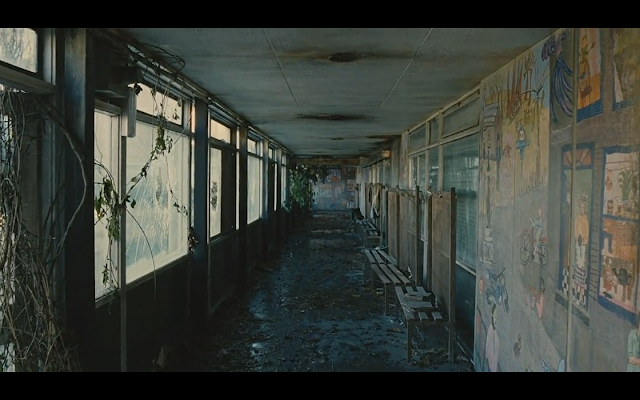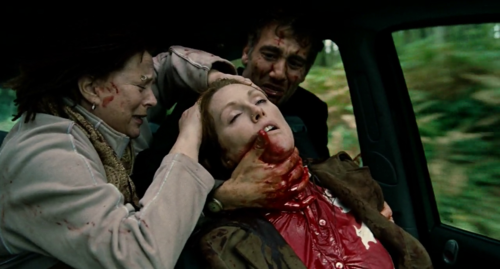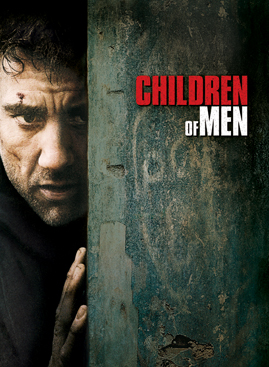 |
| Movie poster for Children of Men |
Children of Men immediately draws critical attention to this futuristic declining world’s tendency to turn women and children into symbols. The opening scene shows droves of people mourning the death of the youngest person in much the same way that celebrity deaths are mourned, setting up the 18-year-old man as a symbol of youth and a reminder of humanity’s impending extinction. The activist immigrant rights group, the Fishes, sees young pregnant Kee (portrayed by Clare-Hope Ashitey) as a symbol. She is not only a West African immigrant, but also the only woman to become pregnant in 18 years. She is a symbol of the humanity of immigrants, the salvation of the human race itself, and of a coming revolution. It is also made clear that women are forced to submit to fertility tests or face imprisonment, rendering these survivors little more than failed symbols of reproduction and shamed symbols of infertility. Though the film overtly critiques this desire to turn human beings into symbols, it indulges in it quite a bit.
The scene in the abandoned school is pregnant (pun intended) with symbolism.
 |
| “As the sound of the playgrounds faded, the despair set in.” – Miriam |
As the young Kee sits alone on a rickety swing set, the camera pans the dilapidated building and Miriam recounts her experiences as a medical midwife at the beginning of the pandemic. The scene mourns imaginary children who never existed along with an imaginary future that proves likewise illusory. The empty school reinforces the crushing absence of children, which in turn represents the absence of a future.
The film apparently resists turning pregnant Kee into a symbol by showing that the only sane response to her pregnancy is that of Theo’s overwhelming desire to get her to a doctor so that she can receive necessary medical attention. However, when Kee reveals the fullness of her pregnant stomach to Theo, it is nothing but indulgent symbolism. She takes her shirt off in the middle of a barn full of cows, her posture of one hand covering her breasts and the other cupping her belly simultaneously one of modesty and fecundity.
 |
| Kee is dehumanized and symbolized |
This image of the pregnant black woman amongst livestock paired with the swelling music that evokes apotheosis is particularly offensive to me. Her humanity is transcended into grotesque female-coded symbols like earth, goddess, fertility, and nature. Her blackness is racistly used to reinforce the nature symbolism as well as the birth and beginning of mankind. The deliberateness of these symbols is even more apparent when the original PD James text The Children of Men is considered in which Julian (played by middle-aged white Julianne Moore) was the character with the mystical pregnancy. Though it is impossible to not read some symbolism into Kee’s pregnancy, her “revelation” scene is exploitative and is done dramatically and specifically to benefit the male viewer in the form of Theo.
 |
| The unsavory Marichka driving Theo & Kee to a filthy room for the night |
Julian, though a strong woman, is too often shown from Theo’s perspective as the beautiful, unattainable bitter ex-wife and forever mourning ex-mother. Not only that, but she dies suddenly very early on in the film. Her death itself is the most important thing about her because it’s an inside job, showing that the so-called immigrant rights activist group has questionable morality and can be trusted no more than the oppressive government regime. Therefore, Julian’s death is highly symbolic and paradigm shifting.
 |
| The Fishes scorn Julian’s non-violent methodology and murder her in order to exploit Kee’s baby as a symbol for revolution. |
Not only were there few representations of non-symbolic women, but the entire film, a film about fertility, motherhood, and childbirth, is told from the perspective of a man. The most flagrant example of a marginalized female character is Kee. She is a child herself with no true agency, who knows nothing of pregnancy and motherhood, who must rely on the experience and protection of Theo. Kee’s lack of agency and complete reliance on Theo set up yet another patriarchal iteration of genesis wherein the rebirth of the human race isn’t due to Kee and her baby girl, Dylan; it’s due to the perseverance of a lone man whose ideals may be jaded, but he feels compelled to “do the right thing” no matter what noble sacrifices it might require.
 |
| Theo sacrifices his own life to protect Kee and her baby, ensuring they make it to safety first |
Not only is Theo the martyr and savior of this film, but he knows more about motherhood than Kee does. He delivers the baby, coaching Kee on how to breathe and push, motivating her when she is overcome. He then delivers Kee and her baby to the so-called safety of The Human Project (a secretive group purporting to be searching for an infertility cure).
| Kee’s pregnant body is turned into an icon. |
Children of Men‘s depiction of women as props, tools, symbols, or cardboard underscores the notion that women’s true purpose is reproduction, and when women can’t reproduce, they’re not only useless, but society itself collapses under the burden of their neglect of duty. Despite many of the intriguing themes this film explores (including a scathing denouncement of the treatment of immigrants), Children of Men ends up falling in line with its mainstream contemporaries to assert that women are merely bodies, that a woman’s value lies in her ability to reproduce, and that she has and should have no control over that body or that ability to reproduce.
